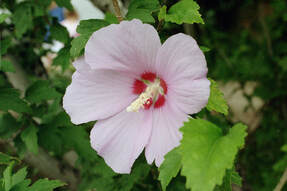
Mountain Flower (English Translation)
by Kim So Wol (1902-1934)
There are flowers blooming in the mountain
Flowers are blooming
It does not matter if it is Autumn, Spring, or Summer
Flowers are blooming
In the mountain
In the mountain
The awakening flowers
Are blooming there by itself
The little bird that cries in the mountain,
Because it likes the flower
In the mountain
It lives
There are flowers withering in the mountain
Flowers are withering
It does not matter if it is Autumn, Spring, or Summer
Flowers are withering
In music education scholarship, Sangmi Kang writes of the song Arirang: “Various versions of the song “Arirang” have been performed all over the world in a wide range of musical styles. Currently, thanks to the explosion of musical material on the Internet, music educators can easily access these performances for their classrooms. This gives students the opportunity to appreciate and analyze the song from different perspectives, both Eastern and Western” (p. 34). In the spirit of appreciation, I am listening to Korean music that can give me an opportunity to appreciate this music from different perspectives. Here is a link to Arirang: https://youtu.be/5xGSngr275c
Today, however, I’m listening to the Korean court music (aak) composition Sujecheon. According to KBS World Radio (an international broadcaster that seeks to present programs and news on Korea’s politics, economy, society, culture and traditions for a global audience):
“The ancient song is about a woman’s prayer for her husband, a street vendor at a market. When he fails to return even late at night, she sings to the moon to rise up even higher so that the moonlight can better illuminate his way home. This song was passed down many generations, through the Goryeo period and the Joseon Dynasty. However, its lyrics have been lost over the long years, leaving only its melody. Renamed “Sujecheon” in the Joseon Dynasty, the music was performed as an accompaniment piece for the royal dance “Cheoyongmu (처용무)” and sometimes when the crown prince traveled.”
In contrast to the courtly Sujecheon, the poet beginning this post, by Kim Sowol, is well known for writing in a style reminiscent of Korean folk songs (minyo), more like Arirang. As a music teacher, I often teach students about cultures for which I have little experience. Nobody can have an experience with everything. I have never been to Korea. Still, we must try to cultivate intercultural understanding. I believe this is one duty music teachers have; however imperfectly we attempt it. I first heard Korean music in person when my friend Yo-Jung Han invited me to a performance of Korean Music at a local public library in 2012. Listen to Byungki Hwang’s Spring Snow performed by Eunsun Jung at that concert.
In the book “Traditional Music: Sounds in Harmony with Nature” published by the Korea Foundation, there’s a quote by the English scholar Jonathan Condit, “One of the special characteristics I would like to point out Korean music, from court music to folk music, is its diversity and wide range of expression. … In comparing Korean music to Western music, Korean music can be very slow and very fast, but there is no Western music that has the same kind of slowness. It seems that Korean music is one step closer to nature, while Western music is more artificial” (p. 14). This slowness, the book goes on, is connected to breathing. While we listen to Korean music in class I draw students’ attention to breath. What happens when we draw students attention to the experience of “mountain” in Kim Sowol and in Sujecheon? Of flowers? Of nature? How can our study, deep or shallow, deepen our understanding of nature in Western music classes, as well as our appreciation for the depth of philosophy in the Korean artistic traditions?
DS
Link to image: https://en.wikipedia.org/wiki/Hibiscus_syriacus#/media/File:Hibiscus_Syriacus.JPG
 RSS Feed
RSS Feed
